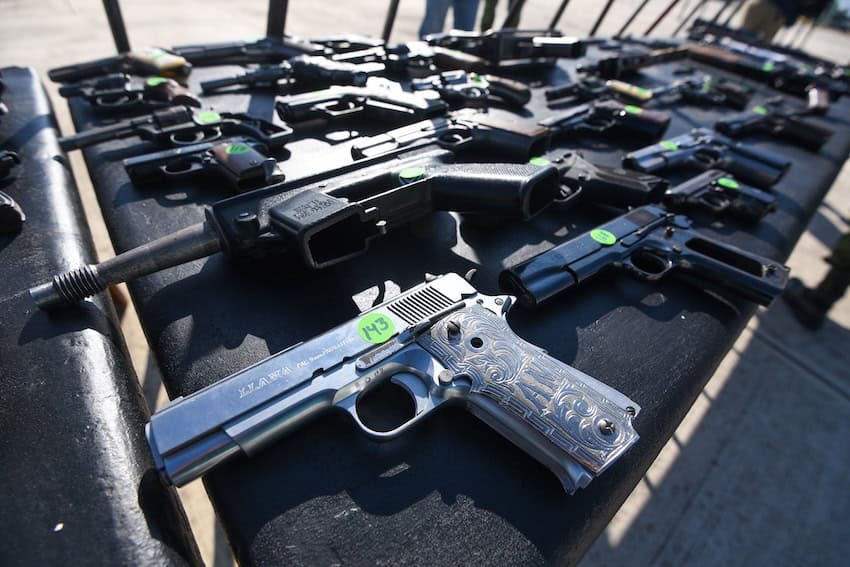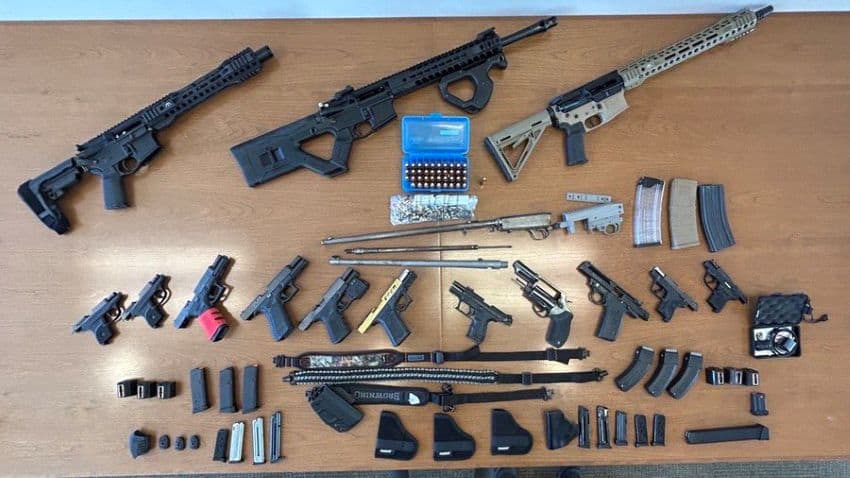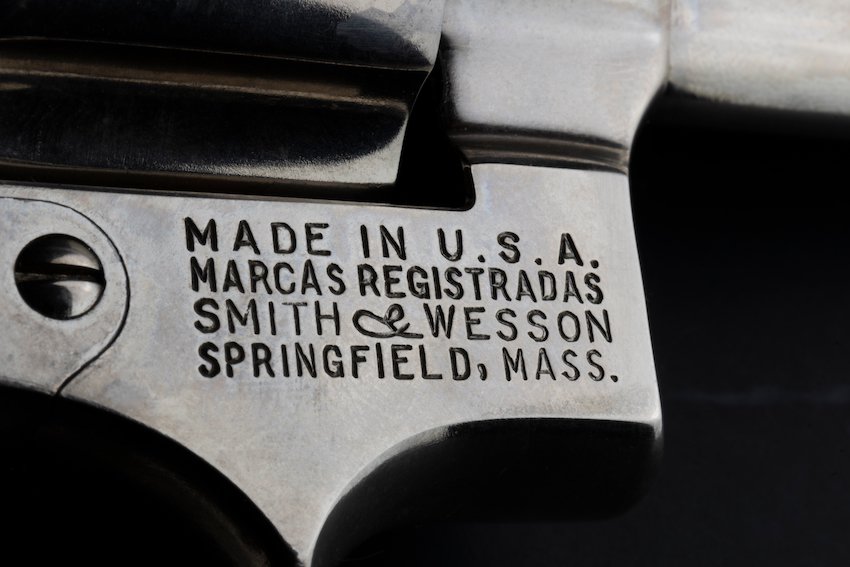The United States Supreme Court on Thursday threw out Mexico’s US $10 billion lawsuit against U.S. gunmakers, ruling unanimously that a 2005 law shields the defendants from prosecution.
Justice Elena Kagan said in the Supreme Court’s written opinion that “because Mexico’s complaint does not plausibly allege that the defendant gun manufacturers aided and abetted gun dealers’ unlawful sales of firearms to Mexican traffickers, PLCAA bars the lawsuit.”

PLCAA is the Protection of Lawful Commerce in Arms Act, which broadly protects manufacturers and sellers of firearms from being held liable when crimes are committed with their weapons.
The Supreme Court’s decision on Thursday came in response to an appeal to a 2024 lower court ruling that was filed by gunmaker Smith & Wesson and firearm distributor Interstate Arms.
In 2021, the Mexican government sued a number of United States-based gun manufacturers and distributors, accusing them of negligent business practices that have led to illegal arms trafficking and deaths in Mexico, where U.S.-sourced firearms are used in a majority of high-impact crimes. Hundreds of thousands of firearms are estimated to be smuggled into Mexico from the United States every year.
The Mexican government accused gunmakers of designing and manufacturing weapons that appeal to cartel members. Colt, for example, has manufactured a pistol embellished with an image of Emiliano Zapata, a hero of the Mexican revolution. Mexico also accused gun companies of “unlawfully designing and marketing their guns as military-grade weapons to drive up demand among the cartels,” Reuters reported.
In addition, the Mexican government claimed that gun violence fueled by firearms smuggled into Mexico from the United States has resulted in a decline in investment and economic activity in Mexico, and asserted that it has had to incur unusually high costs on services such as health care and law enforcement due to gun violence in Mexico.
With the exception of Smith & Wesson and Interstate Arms, the gun companies sued by Mexico had succeeded in having the accusations against them thrown out before the Supreme Court ruling on Thursday.
4-year legal battle comes to an end
The Supreme Court’s ruling came three months after it heard oral arguments in the appeal filed by Smith & Wesson and Interstate Arms against Mexico’s lawsuit.
Those two companies opposed an appeal court’s ruling in January 2024 that the Mexican government’s lawsuit could proceed on the grounds that “Mexico’s complaint plausibly alleges a type of claim that is statutorily exempt from the … general prohibition” of the PLCAA.
Mexico’s lawsuit against Smith & Wesson, Beretta, Colt, Glock and other gunmakers, filed in August 2021, was initially dismissed in 2022 by Chief Judge F. Dennis Saylor of a federal court in Boston, who said that U.S. law “unequivocally” prohibited lawsuits that seek to hold gun manufacturers responsible when people use their products for their intended purpose — i.e. to shoot them.
Mexico appealed that decision, which led to the appeal court’s ruling in early 2024.

Kagan wrote that “the basic theory” of Mexico’s lawsuit was “that the defendants failed to exercise ‘reasonable care’ to prevent trafficking of their guns into Mexico, and so are responsible for the harms arising there from the weapons’ misuse.”
She noted that there is an “exception” to the PLCAA’s “general bar” on lawsuits against manufacturers and sellers of firearms that “applies to lawsuits in which the defendant manufacturer or seller ‘knowingly violated a State or Federal statute applicable to the sale or marketing’ of firearms, and the ‘violation was a proximate cause of the harm for which relief is sought.'”
Kagan wrote that Mexico set for itself “a high bar” in its lawsuit against the gun companies.
“It does not pinpoint, as most aiding-and-abetting claims do, any specific criminal transactions that the defendants (allegedly) assisted. Instead, it levels a more general accusation: that all the manufacturers assist some number of unidentified rogue dealers in violation of various legal bars,” she wrote.
“The systemic nature of that charge cannot help but heighten Mexico’s burden. To survive, it must be backed by plausible allegations of pervasive, systemic, and culpable assistance. Mexico’s lead claim — that the manufacturers elect to sell guns to, among others, known rogue dealers — fails to clear that bar,” Kagan said.
She also wrote that “Mexico’s allegations about design and marketing decisions [of gunmakers] add nothing of consequence” to its suit.

“Mexico focuses on production of ‘military style’ assault weapons, but these products are widely legal and purchased by ordinary consumers. Manufacturers cannot be charged with assisting criminal acts simply because Mexican cartel members also prefer these guns,” Kagan said.
“The same applies to firearms with Spanish language names or graphics alluding to Mexican history — while they may be ‘coveted by the cartels,’ they also may appeal to ‘millions of law-abiding Hispanic Americans,'” she wrote.
Kagan said that her conclusion “aligns with PLCAA’s core purpose.”
“Congress enacted PLCAA to halt lawsuits attempting to make gun manufacturers pay for harms resulting from the criminal or unlawful misuse of firearms. Mexico’s suit closely resembles those lawsuits,” she wrote.
Two other justices filed concurring opinions. It was the first time that the Supreme Court had handed down a ruling related to the PLCAA.
The decision is a significant blow for the Mexican government, which sought $10 billion in compensation from gunmakers as well as a court order requiring gun companies to take steps to “abate and remedy the public nuisance they have created in Mexico.”

It had wanted the opportunity to prove its case against the defendants in court.
Catherine Stetson, lawyer for the Mexican government, told the Supreme Court in early March that it “need not vouch for Mexico’s allegations, but it must assume they are true.”
“Mexico should be given a chance to prove its case,” she said.
For their part, “firearms makers, led by Smith & Wesson Brands, said the chain of events between the manufacture of a gun and the harm it causes after being sold, transported, and used to commit crime in Mexico involves too many steps to blame the industry,” USA Today reported.
While its lawsuit has been blocked, some consolation for the Mexican government comes from the U.S. government’s recent ramping up of its efforts to stop guns crossing its southern border, seizing nearly 9,700 firearms bound for Mexico between Jan. 20, when U.S. President Donald Trump began his second term, and early May.
Mexico has long urged the United States to stop the flow of what is often called “the iron river” of firearms across the two countries’ 3,145-kilometer-long land border.
